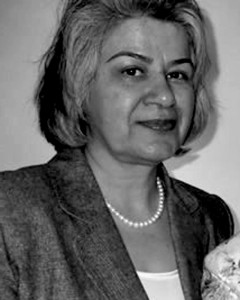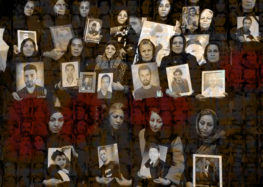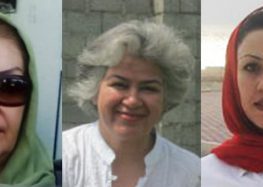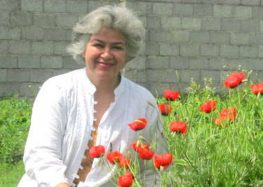Mourning Mothers Supporter Receives 4.5 Years in Prison for Visiting Graves

Mourning Mothers supporter Mansoureh Behkish said authorities have harassed her before when visiting a grave site. "I would tell them, 'They are only flowers! They're not grenades or guns! I'm taking them to the graves.' They would tell me, 'Those flowers were worse than grenades and guns.'"
On 3 April, authorities sentenced Mansoureh Behkish, a supporter of the Mourning Mothers, to 4.5 years in prison for “propagating against the regime” and “assembly and collusion against national security.” Speaking with the International Campaign for Human Rights in Iran, she said that her only crime was visiting gravesites.
“I did not do anything illegal. I told my interrogators, too, that everyone is entitled to go to the grave site of whomever he or she chooses and the law has not set any limitations on this activity. It is my minimum citizenship right to choose whose grave I would visit, and I will not give up my minimum right. They know themselves that what I do is not against the law, but, unfortunately, they build cases against individuals in Iran,” said Behkhish, adding that she was visiting the graves of her family members who were executed in the 1980s, among others.
On 11 June 2011, authorities arrested Mansoureh Behkhish on the street, and released her to a custodian [in lieu of bail] on 8 July. On 24 December 2011, she was tried at Branch 15 of Tehran Revolutionary Court. On 3 April, she was convicted of “propagating against national security” and “assembly and collusion against the regime” and sentenced to 4.5 years in prison.
Behkhish told the Campaign that her interrogators continuously questioned her about visiting her dead relatives at the cemetery:
In the 1980s, my sister, my brother-in-law, and four of my brothers were executed or killed. They never gave us their bodies, nor did they tell us where exactly they were buried, and they never even gave us their last wills. We found out later where they were buried. After that, we were not allowed to visit their graves or to hold ceremonies for them. At each interrogation, there was a different reaction about this. One interrogator would say, ‘Why do you keep pursuing this matter?’ and another would say, ‘They deserved to be killed.’ Towards the end of my interrogations, they came to the subject of Mourning Mothers. They asked me why I went to other people’s graves, why I went to Neda Agha Soltan’s grave. And I said that it is everyone’s right to go to the gravesite of any dead person he chooses to visit. But they said that I was going there to incite others.
Mourning Mothers, or Mothers of Laleh Park, was established after the disputed presidential election of 2009. The group is mostly comprised of Iranian women whose family members were killed in the aftermath of the election. The Mourning Mothers often meet on Saturdays in Laleh Park, and speak out about the government’s lack of investigation and accountability for the deaths of their loved ones. Several Mourning Mothers, such Jila Karamzadeh Makvandi and Leila Seifollahi, have been arrested and sentenced to prison terms.
Describing her interaction with the Mourning Mothers, Behkish told the Campaign:
The group was comprised of some of them and some people like me who had been hurt by this before and a group of others who did not have murdered relatives, but who joined out of sympathy and support. This is the most natural action people take when bad things happen to them. When a neighbor loses a dear friend or a family member, others go to him to express sympathy. I was one who participated in the ceremonies and tried to express sympathy for the families. That’s al.”
She added that her conviction was based on her appearance at gravesites and funeral ceremonies:
And they also said that I was in touch with the Mourning Mothers, that I sent out invitations about ceremonies for their deceased family members, and wrote material about it, and this is why I was accused of ‘propagating against the regime.’ But I told them that in none of my invitations or writings there was anything illegal—they were just invitations to ceremonies. They were upset because I went to Khavaran and Behesht-e Zahra Cemeteries all these years and why I keep pursuing the matter, voicing grievance about it. Of course I never formally filed a complaint about the death of my loved ones, because they would not answer me. But I continually showed my objection by visiting the gravesites and participating in memorial ceremonies for my own family and others who lost their loved ones in the massacre of the 1980s and later in the aftermath of the 2009 election. I wanted to keep their names alive. This was the least I could do. They searched my car numerous times when I was on my way to the cemetery. They stripped the license plate from my car. For example, they would stop my car and ask me what were the flowers in the back? I would tell them, ‘They are only flowers! They’re not grenades or guns! I’m taking them to the graves.’ They would tell me, ‘Those flowers were worse than grenades and guns.’
Behkhish also told the Campaign that it appeared her conviction had been set and decided by the interrogator and not the judge. “The Prosecutor’s representative said that I should be handed maximum punishment. Even so, my lawyer and I spoke, too, but it seemed to me that the court had only convened out of formality.,” she said, adding that the decision seemed politically driven. “These courts are not about determining the defendants’ cases, but to pursue their own interests, and it must have been in their interest to issue such a sentence for me. They are the ones in power, after all.”
Prior to her June 2011 arrest, Behkish told the Campaing she had been detained several times.
Once, in 2007, there was a ceremony by a mother who had lost her children in the massacre of 1988. Through the years, despite all kinds of pressure, families still tried to hold ceremonies to keep the names of their loved ones alive. In this private ceremony, fewer than 20 people were present and they were are older women. The forces entered the home brutally and threatened us with shoes and guns. One of the women passed out and the rest were very frightened. The next day, forces stormed my workplace at a private bank and handcuffed me, saying that I was a drug trafficker, and took me away. I told the real reason for my arrest to my co-workers in a loud voice. I lost my job after that and wherever I went for work, that organization’s security unit would prevent my employment. I remained unemployed.
In 2010, authorities arrested Behkish and confiscated her passport. “I was hoping to be acquitted and for my passport to be returned to me, so that I could go back to my normal life. I have nothing more to say, except that I am sure one day people’s grievances will overflow and will no longer be controllable,” she said, adding that she will object to her sentence.
The Observatory for the Protection of Human Rights Defenders, a joint program of the International Federation for Human Rights (FIDH) and the World Organization Against Torture (OMCT), issued a call on Iranian judicial authorities to end her harassment.




